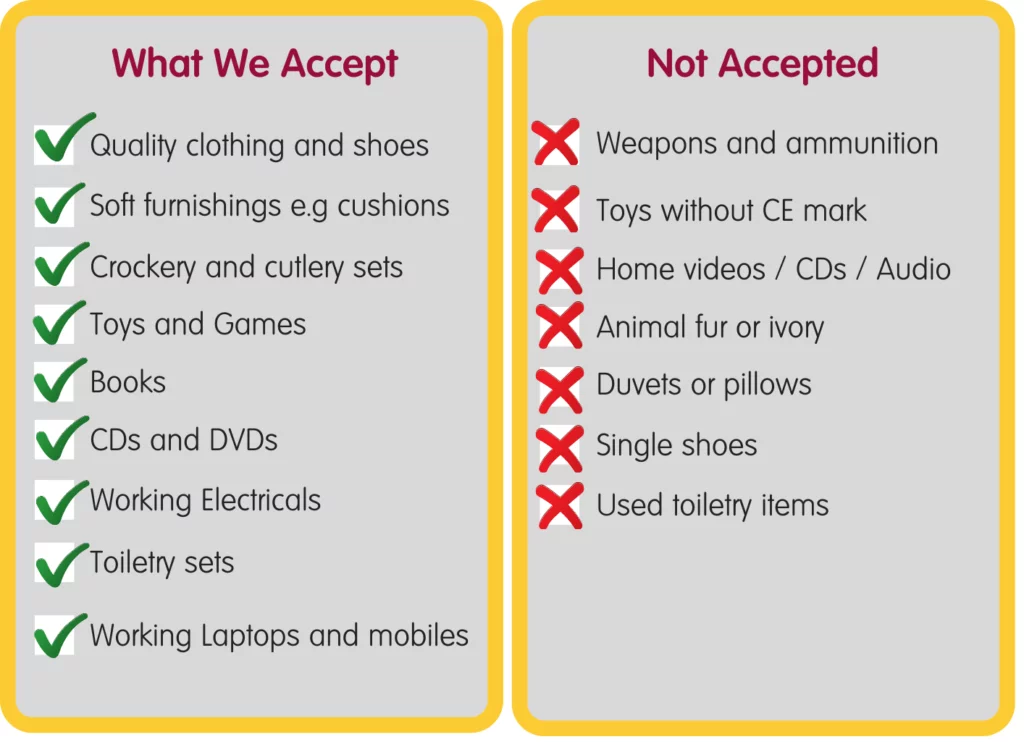News Hub
What Items Should You Not Donate to Charity to Help Save Vital Funds
When it comes to donating items to charity, many people assume not-for-profits can sell and raise funds from everything they’re given. Unfortunately, it’s not as simple as that. It’s true that charities need items to keep shops and online stores stocked, but, unfortunately, there are occasions when donated goods actually end up costing charities money. The BBC have recently shared a news article on the impact this is having for charities post-lockdown.
What is the financial impact of unsellable donations?
The past year has seen many people using their time spent indoors to declutter. This is great news for charities as it has led to an influx of items being donated and ready for stores to sell when they reopened and online. Unfortunately, it’s also meant that items that may have been destined for the tip, make their way into donation banks, are dropped off at donation points or posted to donation depots. The issue is that many people don’t realise the costs of disposing of these items that can’t be sold on is a huge burden for a charity.
There are ways for charities to make money from items they are unable to sell, through overseas sales or sending for rag, but for many charities, the wastage costs can amount to tens of thousands of £s per year.
This figure is for the disposal of items that are deemed unsafe, irreparable or general waste, taking away funds that could be used by a charity to provide vital services, which in the current climate, is more important than ever.
What happens to items that can’t be sold?
Items that are in a condition unsuitable for selling or beyond recycling have to be disposed of at cost to the charity. This is why charities urge supporters to donate items that are complete, in good condition and are still regularly used.
Items such as 20+ year old computer monitors, broken mobile phones, stained duvets and sleeping bags are commonly given through the different means of drop off, as it’s thought a charity will be able to benefit from them. However, this is very rarely the case – unless these have been specifically requested – so they become a financial cost to the charity. It’s therefore vital to appreciate that a charity may have to turn down items they are being offered, to avoid wastage costs.
What not to donate to charity
There’s a general rule that if the condition of the item is not in the condition you would want to buy then it’s unlikely someone else will. Here are some common items that drastically add to disposal costs and should not be donated:
- Broken or damaged items
- These can’t be sold, and it’s unlikely even with repairs someone will purchase an item that is faulty.
- Incomplete sets or missing parts
- Anything that is incomplete such as boxed sets or children’s toys cannot be sold.
- Used toiletries, completed puzzle books or used school books cannot be sold on.
- Food or drink
- Any consumables aren’t able to be sold either in our stores or online. For non-perishables, look to take these to your nearest food bank or drop off at a supermarket with an in-store collection point.
- Electricals that can’t be PAT tested or are without the mains charger
- Ceiling lamps, for example, aren’t able to be sold on due to the fact there’s no guarantee of their usability or safety.
- Bedding such as duvets and pillows
- These can’t be resold on but are often put in donation banks which take up room and prevent possible sellable items being donated. Many animal shelters will take bedding so if you want to donate, reach out to your local shelter.
- VHS tapes
- Although deemed as retro, these don’t sell and are extremely niche. Look at alternative methods of donations such as at local libraries or specific media sites.
- Poor quality books
- Books are one of the most successful sales for charities, but only in reasonable condition. Bleached, crumpled or stained pages and torn covers don’t sell, but may be welcomed in community book groups.
- Towels
- Unless in brand new packaging, towels are not a popular second-hand buy, so similar to bedding, animal shelters may be worthwhile contacting.
- Prohibited Items
- There are a list of these items that are standard across various charities which are to not be donated such as weapons, ivory and fur to name a few. Here is a full list to check.
For more information on how and where to donate items, visit our reuse information page which outlines our computer and electronic recycling services, as well as our Donation Bank locator. Please contact us for more information on items you may want to donate but would like to discuss.


